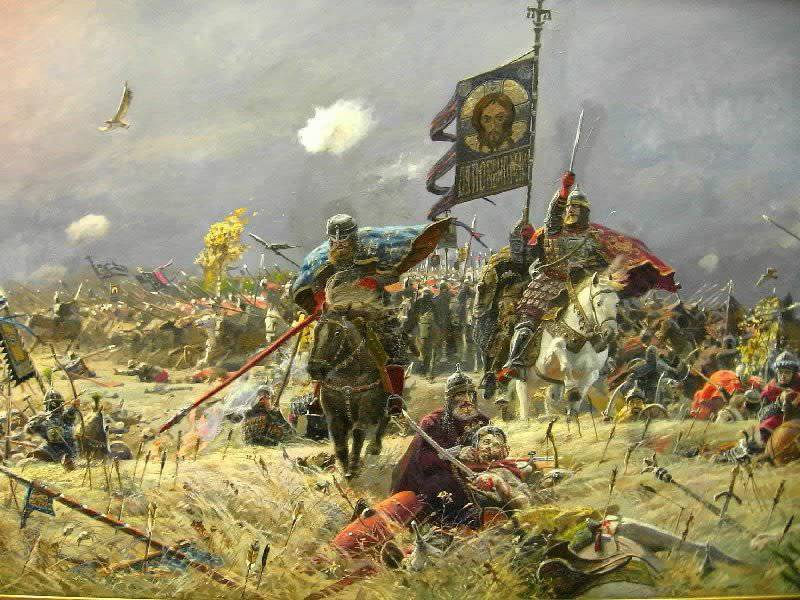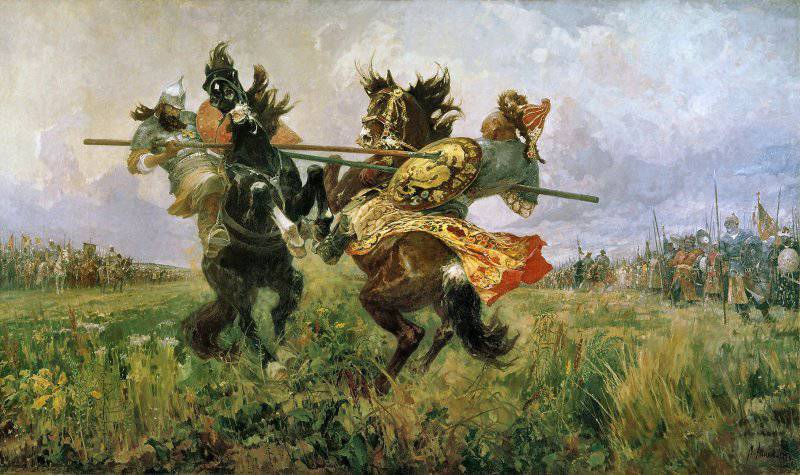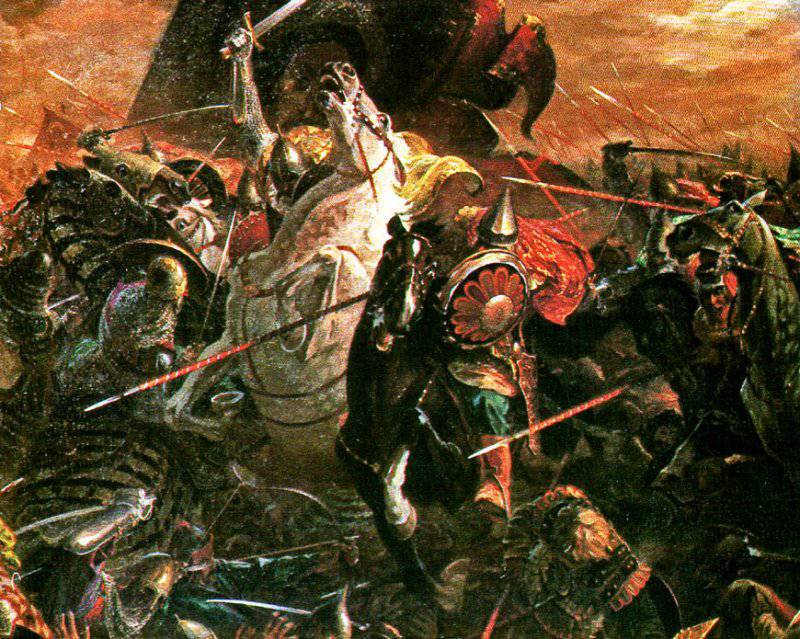Secrets of the Battle of the Kulikovo Field
Such events are predetermined return.
They have yet to be solved. ”
Alexander Blok.
On the course and result of the Kulikov battle, one of the most famous events of the Russian stories, it says so much in monographs and textbooks, in panegyrics and poems, from the stands and at meetings that, on the one hand, there is practically nothing to add, but on the other, it is almost impossible to separate inventions of different eras from what actually happened.

Indeed, a careful study of Mamaev’s carnage turns out to consist entirely of only “dark” spots and, despite detailed descriptions, hundreds of years after the events, which largely determined the vector of Russia's development, it is possible that a stable generally accepted opinion is a highly distorted version of reality . After studying a lot of articles and documents on this issue, it became clear to scientists only one thing: in the battle under consideration, the victory was won by the Moscow Prince Dmitry Ivanovich, later called Donskoy. All other legends and myths cause only reasonable doubts.
Having tried to deal with the main points of the Kulikov battle and the events anticipating it, it is necessary to determine who Mamai was and why he actually went to the Russians on the ground by war? The poetic presentation of the “Zadonshchina”, written similarly to the “Talk of Igor’s Regiment,” regards Mamai as the legal representative of the authorities from the Golden Horde. However, other sources do not support this point of view, considering it a temnik (the leader of ten thousand soldiers), who acted in his own interests and sought to gain power through conquests and dubious alliances with the Lithuanian princes.
Some authors are inclined to say that it was Ryazan and Lithuanian rulers who advised Mamai to oppose Dmitry of Moscow, promising him their support in order to stop Moscow’s zealous attempts to conquer, in their opinion, the primordially Lithuanian (Moscow) and Ryazan (Vladimir, Kolomna, Moore) lands and unite under its wing all the principalities. The aggressiveness of the initiators of the hostilities was quite understandable, because shortly before the Kulikov battle, Dmitry managed to defeat Lithuanian troops who were striving for Moscow and to establish their rule over Tver and Nizhny Novgorod lands.
According to other historical data, Moscow was one of the most loyal and obedient vassals of the Horde, regularly paying tribute, wanting to get assistance in confronting its western enemies (Germans and Lithuanians). When the power in the Golden Horde tried to seize the rebel Mamai, who did not even belong to the genus of the true Mongol khans-Chingizids, Dimitry had no choice but to side with the legitimate ruler of Ulu Ulus.
On September 7, in the evening, five Russian regiments were built into battle formations. The sixth regiment headed by Prince Vladimir Andreevich Serpukhovsky was hidden in an oak grove located above the river. Tatars also appeared on the Kulikovo field by noon the next day. The battle began with small fights of the forward detachments, then the famous duel between Chelubey and Alexander Peresvet took place, in which both bogatyrs died. After that, the main forces came together. The main blow of the Tatars was sent to the regiment of his left hand, the Russians could not resist and, pursued, ran towards Nepryadva. When the Tatars set up an ambush regiment behind the lines, Prince Vladimir Andreevich ordered an attack. This attack decided the outcome of the battle. The famous Tatar cavalry was driven into the river and killed. At the same time, the Lithuanian regiments went on the offensive. Mamai had no reserves, all his army was confused and fled. Tatars pursued a few more kilometers.
According to the version outlined in the textbooks, this victory secured Moscow’s status as an ideological center for the reunification of Eastern Slavic lands, marking the beginning of their deliverance from a foreign yoke.
Another reason for the battle on the Kulikovo Field is Mamai’s desire to prevent the trading of Moscow merchants with Crimean merchants. The Moscow prince took ten Surozh (I mean, the Crimean) merchants, who, apart from their participation, supported his performance financially. Apparently, they saw their benefits in what was happening. This becomes clear if we consider that the approaches to the Volga were blocked by the Horde, and the Dnieper was controlled by the Lithuanian prince Jagiello. And the fact that the war of Mamaia blocked the Don, caused a direct threat to free trade in this direction. And since Moscow received a tax from the merchants, the prince was also not profitable to silently watch their ruin.
Whatever the true cause of the start of the battle, the next key question that historians ask is the strength of the opposing sides. Since Mamai was not the true ruler of the Golden Horde, the number of his troops indicated in some sources, from fifty to eight hundred thousand people, as well as the quantitative estimate of Dmitry’s supporters, are of great doubt. Researchers suggest that when later events were described by army authors, the number of armies was erroneously estimated, in view of the fact that “a thousand” - as a combat unit of the army, was taken as a real thousand soldiers, although in reality there could be only about a hundred in this formation. In addition, the narrators of ancient times were always prone to hyperbole to multiply the merits of their rulers, and the history of the Kulikovo battle was written mainly by Moscow chroniclers of the fourteenth century.
The current assessment of the situation makes it possible to talk about more modest figures of troops participating in the battle. Being a usurper of power in the Horde, Mamai simply could not gather such a large army, which is referred to in a number of descriptions of the Kulikovo battle. In addition, almost all the mentions of his army indicate the presence of mercenaries from among the peoples of Kuban (Pechenegs and Polovtsians), the Caucasus (Alans and Yasy), the Black Sea Coast (Cherkasy and Vagrants) and the Crimea (bezsermen and fryagi), but there is no data on participation in his army of Tatars, as the indigenous inhabitants of the Horde. This cannot but cause surprise, because according to the original idea, Mamai defended the interests of his native nation, speaking on its behalf. Apparently, they are not without grounds for the statement that he himself was a mercenary, representing a third interested party, for example, the same Lithuanians or Genoa, who wants to eliminate competition in the person of Russian merchants in Crimea. Then the participation of the Genoese on the side of Mamai and the strange temporary pause, which Temnik had kept before the performance, is quite understandable. Expecting their support, Mamai could pay dearly for this, because on the other hand, Tokhtamysh’s troops threatened him.
In “Zadonshchina”, as well as the “Tale of the Mamai Massacre” written on its basis, the combined army of Mamaia is described as a huge and well-armed two hundred thousandth army. After much research, historians still tend to assume that this figure needs to be reduced by a factor of 6-10. A similarly exaggerated number of Russian troops participating in the battle can be subjected to such criticism. The number of one hundred and fifty-two hundred thousand seems fantastic. There is evidence that the army of Dmitry consisted of only six regiments. On this basis, as well as having information about the average number of inhabitants of Russia in that era, scientists assume that the number of soldiers of the Russian prince could not exceed twenty-five to forty thousand people. In addition, since 15 in August, when the collection was announced, and before the twentieth of this month, when the army began a demonstration from Kolomna, it is simply unthinkable to assemble and organize a hundred thousandth army. The lack of mention of a large number of prisoners also prompts reflection on the number of warring parties.
There are also a number of contradictions with the location of the field on which the battle of Kulikovo took place. After the first study of the chronicles and maps of 18-19 of the centuries, it was stated that the real battlefield is located in the south of the present Tula region between the Nepryadva and Don rivers. But neither a large number of human remains or mass graves, nor substantive confirmations in the form of spearheads or other types or parts were found at the alleged site of the battle. weapons that time.
An even more detailed study of the primary sources that reached contemporaries suggested that the Don River meant not the modern Don, which was then called Tanais, but a completely different river. The reason for the mistake was the use of the word “don” itself, which then was synonymous with the word “river”. A number of scientists are inclined to believe that the events took place near Moscow, not far from the Simonov monastery or even at the place of its construction. Here, by the way, the remains of at least two heroes of the Kulikovo battle, Oslyabya and Peresvet, are buried. It would be quite natural to believe that the bodies of the soldiers were buried near the battlefield, and did not travel for several weeks to the suburbs of Moscow.
Inhabitants of the newly re-opened Church of the Nativity of the Virgin claim that around it, within a radius of hundreds of meters, the land is several meters deep literally packed with human remains, which construction workers constantly ran into during land works.
This version, of course, does not claim to be the ultimate truth, but the same idea is confirmed by the study of the geographical details of the area near the Simonov monastery, where the Moscow River is located, into which the Sara river flowed into those days. The small river Nepryadva, which flowed right through the battlefield, could well turn out to be the river Naprudnaya, which is in Moscow on Kulishki. In the process of reconstruction of ancient texts, the names could be partially changed.
Of course, it can be argued that the Kulikovo triumph was the largest at that time in the history of battles with the Tatars, and it was achieved through the joint efforts of many principalities. But…. About sixty percent of the entire command staff of our troops and about a third of all soldiers died in the battle. And when the wagons carrying wounded warriors fell behind the main forces, the Lithuanians Yagailo and some Ryazan troops mercilessly finished off and plundered them. Later, Tokhtamysh managed to unite the split Horde and after a couple of years went to deal with the recalcitrant Russians. Almost the entire population of Moscow was massacred, and the survivors were taken prisoner. The city was burned, and almost the entire culture of the principality perished in the fire, since, fleeing from the basurman, the local residents brought all the values to the capital. Payment of tribute was also resumed, and Vasily, the eldest son of Dmitry Donskoy, went to the Horde as a hostage. Half a century after the reign of Dmitry Ivanovich, the assessment of the Kulikovo battle began to change. The Moscow rulers, gaining more and more political weight, were in dire need of a glorious great ancestor - the winner of the hated Tatars. Therefore, on the pages of The Tale, Dmitry Ivanovich appears as a full-fledged autocrat, and the princes are his loyal companions, which in no other way could be in the 14th century.
Apparently, our descendants will still have something to think about, because the Truth is known only to witnesses of those memorable events, and, alas, they have long been absent in this frail light. The Kulikovo battle and the events preceding it keep many, many secrets. For example, you can find out for a long time why some documents and annals tell about the blessing of Prince Dmitry to the battle of Sergius of Radonezh, while others talk about the separation of the prince from the church directly before the Kulikovo battle. Despite the fact that research scientists do not have reliable data about any discord between the saint and the prince, behind the meager lines of the chronicles some facts about their conflict can be seen, for example, in these years, the igumen did not baptize the sons of the sovereign. And reconciliation, most likely, occurred five years after the battle, when Sergius helped Dmitry Donskoy to resolve the Moscow-Ryazan conflict. There is evidence that in the 1380 year, Dmitry received a blessing from the Kolomna bishop Gerasim.
Discussions also arise around the degree of participation of the main “hero” of events - Prince Dmitry Ivanovich, who, according to some sources, avoided managing the battle, and Vladimir Serpukhovsky had to lead the army. The prince also took off his armor and, handing them along with the horse and the beloved boyar Brenku, changed into other people's clothes. Such a description of events is rather doubtful, even without taking into account attempts to blacken the reputation of a glorious Russian leader. Suffice it to recall the structure of the armor, their values and the enormous prestige of the Russian princes, without whom the squad simply refused to go into battle. The reason for the absence of Dmitry directly on the battlefield, apparently, will remain secret, exactly, as well as why he and the other Russian princes did not continue the struggle against the Tatar-Mongol yoke, so successfully begun. And here is another mystery. How to understand the old Russian saying that every resident of our country knows: “Like Mamai passed!” Not Tokhtamysh, Baty or Devlet-Girey, namely Mamai. Mamai, who was defeated on the border of the Russian land in a deserted place.
Although the Kulikovo battle was greatly embellished by the chroniclers of the later periods, the discrepancy between the actual circumstances and the dust covered works of time does not detract from the heroism of those who fought on this field for the Russian lands, wherever it actually is. The Kulikovo battle is the main military episode of the XIV-th century of Russian history and a turning point that replaced the era of endless Tatar robberies, bloody, and humiliating princely "fights." From this point in time, little Moscow began its journey to the center of European politics, and in Russia a spiritual upswing began, a change in the psychology of our ancestors, who had overcome oppression and despair, fed the country over generations of terror and plunder.
Today, there are already four main camps, interpreting the events that took place on the Kulikovo field in their own way. For example, traditionalists adhere to a conservative version, and supporters of the “Orthodox” interpretation strongly mythologize the battle, focusing on the confrontation between Christian Russia and the steppe gentiles. Adherents of the “liberal hypercritics” believe that Dmitry Donskoy merely defended the Tatar king from the impostor and usurper Mamai. Their opponents reasonably ask, why then did Tokhtamysh destroy Moscow in two years? The last "Eurasian" camp is represented mainly by modern Tatar historians. Their opinion is that the Kulikov battle is undeservedly exaggerated, it arouses interethnic hostility and is only a minor skirmish between two rulers who perceive their possessions as “subjects” of one “federation” (like the princes of the Holy Roman Empire). The leadership of Tatarstan, opposes the celebration of the anniversary of the Mamayev massacre, and the echoes of this position have recently been heard from the Kremlin. However, the political weight of the supporters of this theory does not make it true.
Supporters of the “four views” do not want to try to unite their forces, and on the basis of constant accusations, truly charlatan interpretations of history flourish. We must know what happened in the distant past of our Motherland. How our ancestors saw this battle, what imprint in culture left legends. Retaining the right to choose a “beautiful” myth or “boring” reality, we must make this choice consciously and responsibly.
Information sources:
-http: //www.vokrugsveta.ru/telegraph/history/427/
-http: //www.diletant.ru/blogs/2815/101/
-http: //x-files.org.ua/articles.php? article_id = 2742
-http: //pereformat.ru/2013/01/kulikovskaya-bitva/
-http: //ru.wikipedia.org/wiki/


Information